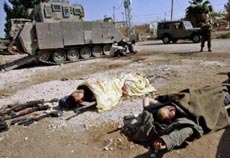|
Israel Kills More Palestinians, Drags Feet on Gaza Borders
 |
|
Israel was "almost acting as though there has been no withdrawal," Wolfensohn said.
|
OCCUPIED
JERUSALEM, October 24, 2005 (IslamOnline.net & News Agencies) –
A few hours after its troops killed three Palestinians, including a
senior Islamic Jihad leader, an international envoy blasted Israel for
foot-dragging on opening Gaza Strip border crossings following its
withdrawal.
Israel
was "almost acting as though there has been no withdrawal,
delaying making difficult decisions and preferring to take difficult
matters back into slow-moving subcommittees," James Wolfensohn
told the Mideast Quartet Committee in a letter, a copy of which was
obtained by Reuters on Monday, October 24.
"Time
is short and optimism is a fragile commodity," he said.
"If
all of us Palestinians, Israelis, our friends in Egypt and donors miss
this opportunity for change, we will regret it for the next
decade."
The
Mediterranean costal strip has been largely cut off from the outside
world since Israel completed its troop withdrawal on September 12
after 38 years of military presence.
Israel
still maintains tight control over the strip’s airspace, harbor and
crossings, turning it into an open-air prison.
Palestinians
hope Gaza will become the embryo of a much-hoped state. They want
their state to include the larger West Bank and occupied Al-Quds (Arab
East Jerusalem).
Restricted
Movement
Wolfensohn,
a former head of the World Bank, also hit out at Israel for
restricting the movement of Palestinians.
"Without
a dramatic improvement in Palestinian movement and access, within
appropriate security arrangements for Israel, the economic revival
essential to a resolution of the conflict will not be possible,"
he said.
Wolfensohn
stressed that the number of trucks carrying exports into Gaza had
dropped from 35 a day to "a mere handful".
The
Rafah foot crossing between the Gaza Strip and Egypt has been largely
shut since the Israeli withdrawal.
Agreement
has still not been reached on a formal re-opening, possibly with
foreign monitors to please Israel.
A
promised route that would allow safe passage for Palestinians
traveling between Gaza and the occupied West Bank has not yet been set
up and even the few Gazans who had been allowed to enter Israel have
now largely been barred.
More
Killing
 |
|
An Israeli officer stands near the bodies of Assadi (L) and Ashqar in the West Bank town of
Tulkarm. (Reuters)
|
On
the ground, Israeli forces killed three Palestinians in the occupied
West bank Sunday.
Louai
Saadi, overall commander of the Islamic Jihad's Al-Quds Brigades in
the West Bank, was one of two Palestinians killed in a shootout with
Israeli soldiers, Palestinian and Israeli security sources said
Monday.
Palestinian
security sources named the second dead as Majed al-Ashkar, 28.
The
pair were shot during an exchange of fire with Israeli troops who had
surrounded a house in which they were hiding in the northern West Bank
town of Tulkarem.
The
inside of the house was found spattered with blood after the fierce
gunfire.
Israel
accuses Saadi of masterminding many anti-Israel attack, including a
suicide attack at a Tel Aviv disco in February.
Saadi
had been released from prison by Israel in January 2004 as part of a
deal agreed with Lebanon's resistance group Hezbollah which included
the release a kidnapped businessman and handing over the remains of
three soldiers.
Chief
Palestinian negotiator Saeb Erakat accused the Israeli army of seeking
to liquidate Saadi from the outset of the operation, saying the deaths
would undermine the fragile truce.
"We
condemn the Israeli escalation at Tulkarem and also this assassination
policy which threatens the cool-down," Erakat told AFP.
Saadi
is the most senior Palestinian resistance leader killed since the
start of an eight-month-old ceasefire.
Though
Islamic Jihad has stated its commitment to the truce along with most
other groups, it has insisted it has the right to respond to Israeli
raids.
Palestinian
resistance factions have been observing a de facto truce since
Palestinian President Mahmoud Abbas was elected in January, an
agreement that was cemented at talks brokered by Egypt last March.
The
shaky truce has repeatedly been put to the test by Israeli
assassinations of resistance activists and incessant attacks.
|